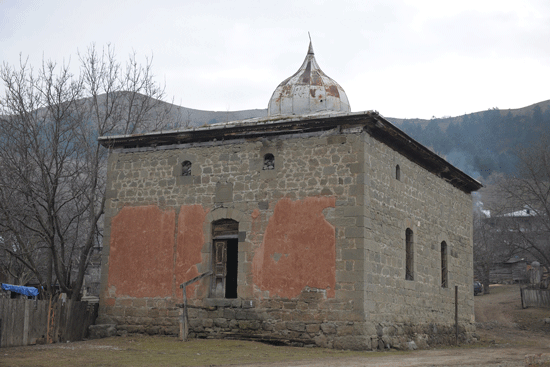Natia Gogolashvili
“There is Saint George’s Church here. People come and give alms to the church. Once, on the St. George’s Holiday, a man from Atskuri village brought a sheep and sacrificed to the church. Then he heard a voice in the dream – “have I offended you?” and next day he come and sacrificed the sheep to the Mosque too,” you will hear many similar stories in Sakuneti village from locals, the Mosque and Orthodox Church are located several meters away from each other. The church is functioning but the mosque is abandoned. In 2012 the Sakuneti village mosque received status of the cultural heritage. According to the inscription it was constructed in 1927.
“Two historical monuments are located next to each other in Sakuneti village: one is Orthodox Church and second is Mosque, which recently received the status of cultural heritage from the state. It demonstrates that Georgian people used to live in tolerance together and there were two sites of worship of completely different religious communities in one village,” executive director of Human Rights Center Aleko Tskitishvili said.
The Sakuneti Mosque once had a balcony in the front but now it is demolished. Walls and columns are cracked and damaged. Locals say there was a football playground near the mosque and the balcony was deconstructed for that reason. According to locals, during Soviet Union, the mosque building was used for different purposes, for example as a warehouse to store wheat in it.
The Sakuneti Mosque belonged to Muslim Meskhs. In 1940s the Stalin’s regime exiled the Meskhs from Sakuneti village to the Middle East as “untrustworthy elements.” Since then the Mosque lost religious function and was used for different purposes.
Nowadays, Muslim community requests restoration of the mosque to preserve the cultural heritage from deconstruction. “It is necessary to restore this century-old mosque to protect the building from collapse. Moreover, the mosque has status of the cultural heritage. Unless it is restored, the historical mosque will ruin and it will be shame of our country,” said Mufti of Samtskhe-Javakheti region Mamuka Vashakmadze.
It should be noted that part of local Orthodox population also requests restoration of the mosque. However, they have not addressed the district administration with the request. “Once they came, measured the building and said they would restore it. It happened three years ago and nothing has changed since then,” local Orthodox people said.
Nowadays, the mosque is abandoned. Local lady Mediko Gelashvili took care of the mosque and periodically cleaned it for free. However, after journalists reported about her tolerant enthusiasm, the lady was rebuked for “taking care of the Tatars’ chapel”. The family members also suggested her to stop cleaning the mosque to avoid further problems in the village.
“During the visit in Sakuneti we saw how phobias appear in the society and how roughly representatives of state institutions interfere in people’s lives. It was very good example that Orthodox lady took care of the mosque and cleaned it. When journalists reported about it as a good example, some people with unidentified status came here and rebuked the woman for her behavior. We were told these people represented police and state administration. We again observed a situation when representatives of state institutions instill phobias and aggressive feelings in the society. On the one hand the state should take care of culture heritages including the chapels of religious minorities, and on the other hand encourage people who feel enthusiastic to take care similar sites. Nowadays, we see the opposite: these people are intimidated,” said Aleko Tskitishvili.
Although the Sakuneti mosque has status of cultural heritage, there is no banner nearby it indicating at its status and no reconstruction activities are going on.
Director General of the National Agency for Preservation of Cultural Heritages Nikoloz Antidze said the state is obliged to take care of the cultural heritage. However, it is impossible to restore and rehabilitate all monuments in one year. At the same time the state budget cannot fund restoration and preservation of all monuments. It is important that the society also took part in it. At the same time, it is important that big part of the sites of religious worship had owners.
“Bit part of the sites of religious worships shall have owner or user, who will be obliged to preserve and take care of them. Of course the state shall support them in the preservation and care of the churches. Otherwise, the state will remain alone against such a huge cultural heritage and the state budget will not cope with the expenses. Of course the state shall allocate some funds for the preservation of heritage but mostly it should supervise activity of the owners or users of cultural heritage when they restore or use the property,” Nikoloz Antidze said.
Mufti Mamuka Vashakmadze said nowadays the Muslim Community has ownership only over the Mirashkhani Mosque in Samtskhe-Javakheti region. Lately, under the supervision of the State Agency of Religions the mosques are assigned to their community but the process has not yet started in Samtskhe-Javakheti region.
Photo Reportage by Goga Chanadiri
The article was prepared in the frame of the project implemented with financial support of the Government of Canada. This article does not necessarily reflect the views of the donor.
Human Rights Center bears sole responsibility for the content of the article.
News
December 13, 2023
Ethnic minorities outside the peace dialogue
November 6, 2023
‘Peace’ agenda of political parties
Popular
Articles
February 13, 2024




